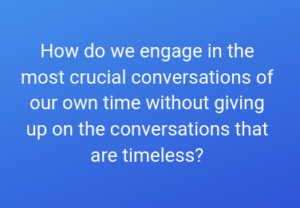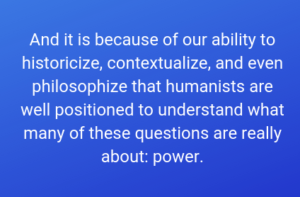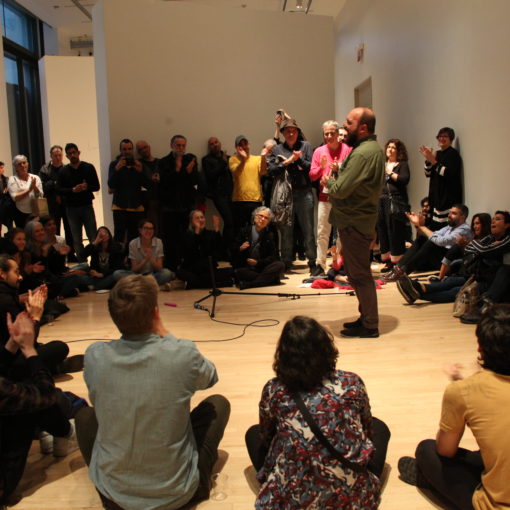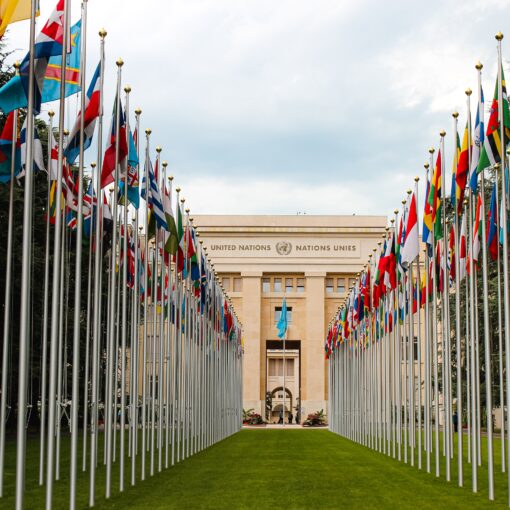
A few years ago, I attended a lecture at the university where I did my PhD. The speaker, an eminent Shakespeare scholar from an Ivy League institution, recounted a dinner she had attended with a recently appointed senior administrator, who was an engineer. Partway through the dinner, he turned to her and said, “I don’t really know much about the humanities. What problems do you solve?”
“Oh, the humanities don’t solve problems!” she replied, probably to his bemusement. “We love our problems. We hold our problems very close. And if ever we are in danger of solving our problems, we simply come at them from a different angle and create new ones!”
This anecdote has stayed with me, because it struck me as, in some sense, true: the humanities don’t solve problems the same way that engineering does. Traditional humanities disciplines such as philosophy, history, and literary studies have a history of wrestling with broad existential questions over many years and across many continents, languages, and cultures. Texts like Shakespeare’s have inspired a centuries-long conversation that has evolved and built on itself. You are never going to solve these problems––indeed, “problem” is probably the wrong word altogether.
And yet, it also struck me, in another sense, as rather too flippant. At a moment when the human species faces the very real possibility that we might bring about our own extinction (and take much of the life on the planet with us), refusing to engage on the basis that “we don’t solve problems” seems like the worst kind of fiddling while Rome burns. But if we give up on the questions that have no answers––on the conversations that link humanity with itself across space, time, language, and culture––then we might very well be giving up on the exact thing that makes us humanists.
Simply put: How do we engage in the most crucial conversations of our own time  without giving up on the conversations that are timeless?
without giving up on the conversations that are timeless?
I think the first thing we must acknowledge is that those humanistic conversations are not, in fact, timeless. Discourse originates in particular moments, places, and bodies. The dominance of white, male bodies in shaping that discourse for many years obscured this, but it has always been true that discourse evolves over time. We are not saying the same things about King Lear that we said about King Lear in 1910 or 1940; we’re not staging it the same way, either. Humanistic conversations may stretch across space, time, language, and culture, but they are also, at any given moment, quite specific.
The second thing we must acknowledge is that the crucial conversations of our time did not spring into being, fully formed, in the 1990s. Immigration has been a hot-button issue for as long as national boundaries have existed; democracy and authoritarianism have always been in tension with each other; questions of the individual versus the group, of gender and race, of justice or the lack thereof––all of these are deeply humanistic questions that undergird many of the crucial conversations we are having now. Even climate change, which on the surface seems specific to our time, is rooted in a tension between stewardship and exploitation of the environment that we have wrestled with for hundreds, if not thousands, of years. This tension seems stretched to the breaking point now, but it is far from new.
Therefore, it’s untrue––and self-sabotaging––to say that humanists must make a choice between the most pressing questions of our day and the timeless conversations that we feel define us.
Indeed, I would argue that among the things that we bring to the table when we sit down with engineers, natural scientists, and social scientists (even, if we’re feeling whacky, economists) is the ability to contextualize, both historically and culturally. We know that these questions didn’t come out of nowhere. We know the ways in which we’ve wrestled with them in the past and what the human cost of our success or failure has been. And it is because of our ability to historicize, contextualize, and even philosophize that humanists are well positioned to understand what many of these questions are really about: power.
 Theorizing power is at the heart of many of the humanistic problems that we continue to wrestle with. The training that we receive in understanding power makes us unusually adept at predicting unintended consequences and foreseeing the ethical dilemmas that are likely to arise from solutions proposed by fields, such as engineering, that are less apt to think about history and culture.
Theorizing power is at the heart of many of the humanistic problems that we continue to wrestle with. The training that we receive in understanding power makes us unusually adept at predicting unintended consequences and foreseeing the ethical dilemmas that are likely to arise from solutions proposed by fields, such as engineering, that are less apt to think about history and culture.
To revisit the anecdote that I began with––it is true to some degree that humanists don’t solve problems, because the problems we wrestle with are largely unsolvable. But although they may be unsolvable, they are not timeless; nor are our current problems without their own long histories. To the extent that we are able to connect the dots between unsolvable, existential humanistic problems and the critical but (hopefully) solvable problems we face now, we humanists will find ourselves far more capable of solving problems than we think.
But in order to do this, it will help to stop telling other people––especially senior administrators at our institutions––that we don’t solve problems. In fact, we should stop telling ourselves that as well.
 Stacy Hartman is the director of the PublicsLab at The Graduate Center, City University of New York. At the PublicsLab, she manages the Mellon Humanities Public Fellowship program, which trains early career graduate students in the humanities in the methods and practice of public scholarship. The first interdisciplinary cohort of 12 public fellows begins in September 2019. In addition to the fellowship program, Dr. Hartman is responsible for developing the PublicsLab internship program, managing a robust slate of events related to public scholarship, and serving as the managing editor of the program’s website. Before coming to The Graduate Center in 2018, she was the project manager of Connected Academics at the Modern Language Association. She is currently co-editing a volume titled Mission Driven: Reimagining Graduate Education for a Thriving Humanities Ecosystem. She holds a PhD in German Studies from Stanford University.
Stacy Hartman is the director of the PublicsLab at The Graduate Center, City University of New York. At the PublicsLab, she manages the Mellon Humanities Public Fellowship program, which trains early career graduate students in the humanities in the methods and practice of public scholarship. The first interdisciplinary cohort of 12 public fellows begins in September 2019. In addition to the fellowship program, Dr. Hartman is responsible for developing the PublicsLab internship program, managing a robust slate of events related to public scholarship, and serving as the managing editor of the program’s website. Before coming to The Graduate Center in 2018, she was the project manager of Connected Academics at the Modern Language Association. She is currently co-editing a volume titled Mission Driven: Reimagining Graduate Education for a Thriving Humanities Ecosystem. She holds a PhD in German Studies from Stanford University.






